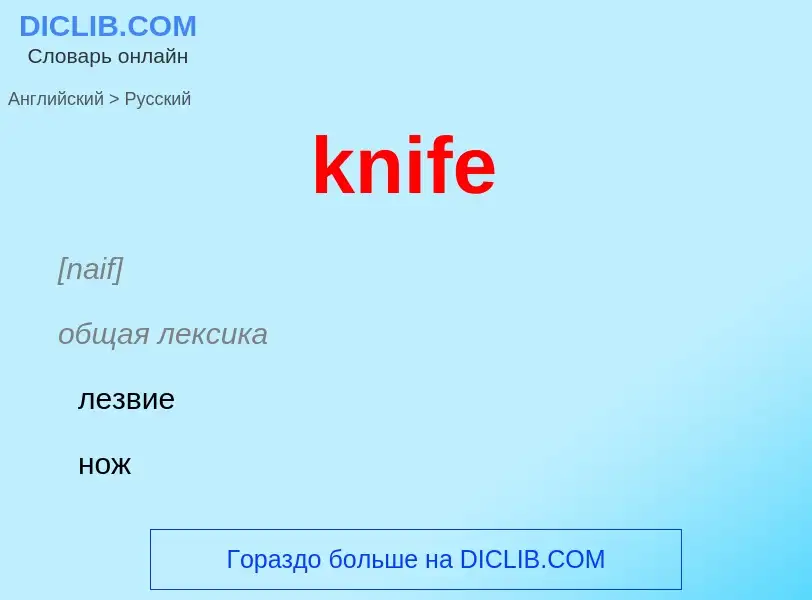Перевод и анализ слов искусственным интеллектом ChatGPT
На этой странице Вы можете получить подробный анализ слова или словосочетания, произведенный с помощью лучшей на сегодняшний день технологии искусственного интеллекта:
- как употребляется слово
- частота употребления
- используется оно чаще в устной или письменной речи
- варианты перевода слова
- примеры употребления (несколько фраз с переводом)
- этимология
knife - перевод на Английский
[naif]
общая лексика
лезвие
нож
ножевой
ножик
струговый
строительное дело
струг
скребок
нефтегазовая промышленность
резец
существительное
[naif]
общая лексика
нож
ножик
(the knife) хирургическая операция
кинжал
кортик
ножевой
медицина
скальпель
техника
струг
скребок
резец
струг, скребок, резец
полиграфия
ракель
синоним
глагол
общая лексика
резать ножом
нанести удар ножом
заколоть ножом
резать (волны)
идти наперерез волнам
ударить, заколоть ножом
разговорное выражение
нанести предательский удар
нанести удар в спину
предать свою партию
вредить кандидату своей партии
собирательное выражение
нанести предательский удар кандидату своей партии (голосуя на выборах за его противника)
Определение
Википедия

A knife (PL: knives; from Old Norse knifr 'knife, dirk') is a tool or weapon with a cutting edge or blade, usually attached to a handle or hilt. One of the earliest tools used by humanity, knives appeared at least 2.5 million years ago, as evidenced by the Oldowan tools. Originally made of wood, bone, and stone (such as flint and obsidian), over the centuries, in step with improvements in both metallurgy and manufacturing, knife blades have been made from copper, bronze, iron, steel, ceramic, and titanium. Most modern knives have either fixed or folding blades; blade patterns and styles vary by maker and country of origin.
Knives can serve various purposes. Hunters use a hunting knife, soldiers use the combat knife, scouts, campers, and hikers carry a pocketknife; there are kitchen knives for preparing foods (the chef's knife, the paring knife, bread knife, cleaver), table knife (butter knives and steak knives), weapons (daggers or switchblades), knives for throwing or juggling, and knives for religious ceremony or display (the kirpan).




![tang]] survival knife. The metal from the blade extends into the handle. tang]] survival knife. The metal from the blade extends into the handle.](https://commons.wikimedia.org/wiki/Special:FilePath/Fixed Blade Full Tang Survival Knife.png?width=200)
![A traditional knife handle made from buffalo horn ([[Tasikmalaya]], Indonesia) A traditional knife handle made from buffalo horn ([[Tasikmalaya]], Indonesia)](https://commons.wikimedia.org/wiki/Special:FilePath/Knife handle made of buffalo horn.jpg?width=200)

![Knives for cutting [[cheese]] Knives for cutting [[cheese]]](https://commons.wikimedia.org/wiki/Special:FilePath/Knives in a cheese shop.jpg?width=200)


![A [[Swiss Army knife]] A [[Swiss Army knife]]](https://commons.wikimedia.org/wiki/Special:FilePath/Swiss army knife open 20050612 (cropped).jpg?width=200)
![The Sacrifice of Isaac]]'' by [[Caravaggio]], (1590–1610; Oil on canvas; [[Uffizi]]). [[Abraham]] is holding the [[sacrificial]] knife. The Sacrifice of Isaac]]'' by [[Caravaggio]], (1590–1610; Oil on canvas; [[Uffizi]]). [[Abraham]] is holding the [[sacrificial]] knife.](https://commons.wikimedia.org/wiki/Special:FilePath/The Sacrifice of Isaac by Caravaggio.jpg?width=200)
![Tuareg]] knife. Tuareg]] knife.](https://commons.wikimedia.org/wiki/Special:FilePath/Tuarknife.jpg?width=200)
